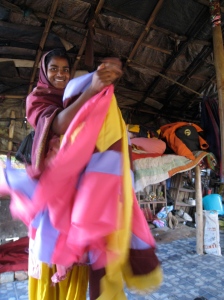There are rules to being a good guest. In Malaysia, we broke them all.
This past week we’ve been living outside SM Success Mechanic shop in the town of Gelang Patah. The shop-owner, Jason Teoh, immediately took a liking to the Biotruck, admiring Andy’s ingenuity and, even more, his audacity to drive the thing around the world.
All the repair work he said For free.
With that, Andy and the team of mechanics spent a week under the bus, replacing wheel barings, filling the tires, repairing the wiring, changing the gearbox oil, and a whole lot more.
Each morning, Jason would idle his car into the lot and rouse us for breakfast. One morning he arranged a press conference and uncorked a bottle of champagne in honor of the expedition. Come afternoons, when we were hard at work on the Biotruck, one his crew members would invariably show up to drop off some take-out chicken and rice.
The shop crew knew how to work hard and played hard. Late evenings, they sat us down to Dionysian feasts. At their goading, we hammered our way through plates of crab, popped the caps off cold Heinekins, and navigated our palates through heaps of inscrutable but delicious Chinese entrees. Around midnight, when we’d leaned back in our chairs clutching our guts in surrender, the waitress would mercifully upend all the plates and platters, dumping all the leftovers into a mountain on the table. She’d then gather up the cloth and haul away the fall-out.
The gorging was taking a toll, but throughout the week Jason served us a few rounds of an ancient Chinese beverage called Birds Nest. The potion—literally made from a bird’s nest—is known to boost vitality and clear up the worst cases of hang-over complexion.
Having not had my own place for nearly three years, I’ve grown accustomed to being in the role of “guest.” I have stayed long stretches in other peoples’ houses, visited their towns. It can be precarious—striking that balance between being a novelty and overstaying. But there are three rules to maintaining goodwill of hosts, which I’ve tried to implement, however imperfectly.
1. Bring your own bedding and towels and a gift.
2. Be an attentive conversationalist
3. Make yourself indespensible.
During our time in Galang Patah, this little set of bylaws which have served me so well in the past, proved to be worthless.
The problem wasn’t so much that we didn’t have our own bedding and towels; we did. But in the Biotruck living space is tight, and we keep nothing that isn’t absolutely functional. Mourn-it-and-move-on is the motto. In this lean spirit, Andy recently had to discard his map of the Annapurnas, and I have to box up several cute, but extraneous, sundresses and send them home. There is no room to be sentimental or aesthetic. Unfortunately, this also means that we have to break Rule Number One: we can’t carry gifts to offer our hosts. As a pathetic substitute, we over-smile and pester them with thank-yous. I sometimes enlist my 3rd-grade level art skills and draw up a crappy thank you card.
So, the least we can do honor Rules Number Two and be good conversationalists. Malaysians are a highly social bunch, holding court in cafes easily until 1:00 or 2:00 a.m. Andy and I, however, couldn’t keep up. The language barrier always created a distance that our clumsy charades could not breach. Our rapport could be strained and difficult and we sometimes just sat there nodding our heads and dumbly gumbing our sea cucumber.
That leaves us with Rule Number Three: make yourself indispensable. Pick up their mail, take out their trash, maybe do a little weeding in the garden. If you do a good enough job and they’ll start to wonder how they ever got by without you. But between Jason’s many businesses, we were of no use to him. He already had a workforce of 2000 at his bidding. We’d have offered him cash, but he beat us to the punch, handing us a wad of bills to support the expedition.
During our week there in Gelang Patah, our every single need was met. I could hardly pry a sprig of tarragon from my teeth without someone handing me a toothpick. If I drained my water glass, it was filled. If I yawned at the dinner table, the driver would stand up and shake the car keys.
I’m still trying to figure out why they liked us so much. Who knew that a couple of hippies in a bus could ever inspire such royal treatment? No one here sneers when we park outside their business, or at our rumpled clothes. When the police drop by the bus, it’s not to tell us to park elsewhere, but to say hi and wish us well.
It all speaks to the relativity of perception, doesn’t it? What one person calls “living out of a car,” another person calls “traveling.” What one person dubs “cheap,” another calls “environmental.” One person’s “homeless person” is another’s “spiritual seeker.”
But it may well just be that our experience in Gelang Patah was less about us and The Biotruck and more about the intrinsic manners and hospitality of Malaysians. This is a high-energy country and economy is good. People are optimistic and there’s enough to go around.
They say that guests are like fish: after three days they start to stink. But if we were starting to smell, Jason and the crew at SM Success didn’t seem to notice. Or maybe they did, but chalked it up to too much Tom Yum. Whatever the case may be, we pulled out of the shop in Gelang Patah in good repair and good spirits and, as we turned onto the road to continue our long journey, our new friends set down their wrenches and air compressors and waved us goodbye. By the looks of it, they were actually sorry to see us go.
For pics of some of the best food and happiest mechanics in the world, click here


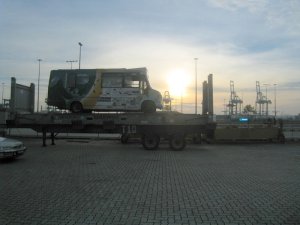
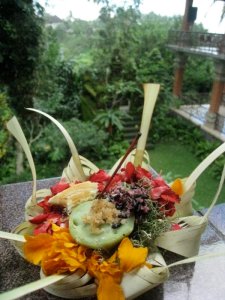

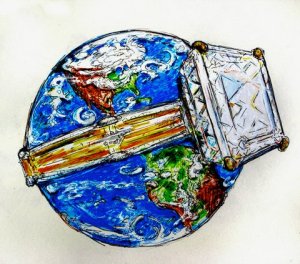
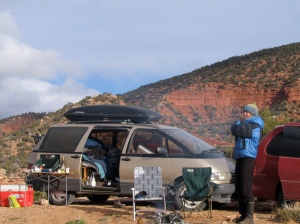
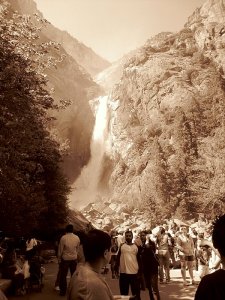
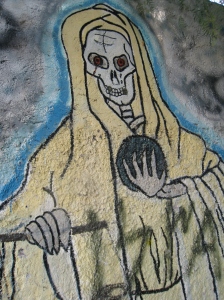 There’s nothing quite like wrestling your demons in a spectacular setting. For me, it took the form of a showdown with my darker emotions in front of a UNESCO World Heritage Site: Guanajuato.
There’s nothing quite like wrestling your demons in a spectacular setting. For me, it took the form of a showdown with my darker emotions in front of a UNESCO World Heritage Site: Guanajuato.
